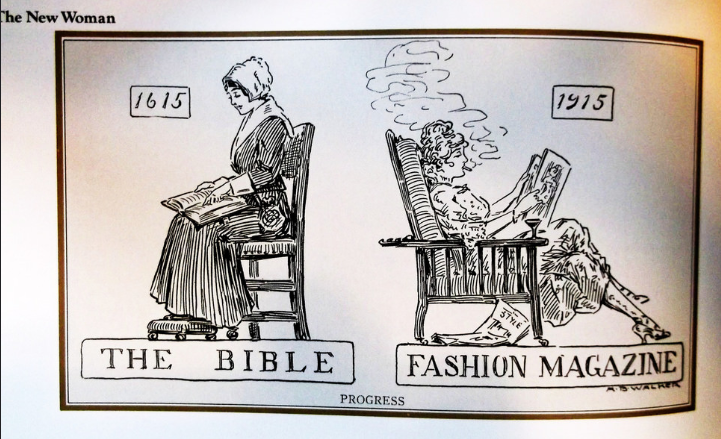hiddenlacuna:davidmalki:questionableadvice:silvermarmoset:questionableadvice:~ “Progre
hiddenlacuna:davidmalki: questionableadvice: silvermarmoset: questionableadvice: ~ “Progress”, 1915 editorial cartoon Society despairs of the Modern Woman, 1915 style History geek note: Now I’m imagining an editorial cartoon from 1615 comparing “Ye Moderne Bible Reading Woman” with the good, old-fashioned women from 1315 who didn’t insist on learning to read the bible for themselves but were content to have a learned Man of the Church interpret it for them. I’d try drawing it myself if I could draw anything other then stick figures. The editorial cartoon from 1615 you imagine actually exists! Or at least, something a lot like it. This is an illustration from the 1600s. First picture shows the good old days, when people carried around lances to stab people with and we actually read literature and wore spurred boots. The second picture is THE DEGENERATE PRESENT, where all these 1600s millennials wear RIBBONS and play DICE and SMOKE and DRINK STUFF FROM SNAKE FLAGONS. Damn 1600s hipsters. It was better when I was your age. Humanity, never change. Look! Silvermarmoset posted an editorial cartoon from the 1600s, providing more proof that no matter what century you were born into you always just missed the good old days. Reblogging this, it’s amazing. Early 20th century British conservative cartoonist WK Haselden ran a whole series like this in 1920, where “Maud of the Eighties” (1880s, that is; sturdy, Victorian times) was faced with modern mores generally or “Gladys of Today” specifically: I’m sure this was a hilarious, cutting insight at the time: By the way, Haselden himself was all of eight years old in 1880. “Born in the wrong time,” I suppose they say. It’s hard to say how much outright disapproval Haselden was expressing when you read, for example, the below – but as I have pointed out before, things like this that read to us today as awesome were usually intended to be read as unseemly and absurd at the time. This is a more overt example of the same sentiment: And before giving him too much credit, I hasten to add he was a staunch anti-suffragist: Haselden did at least seem to recognize the ironies implicit in “good ol’ days” talk: Whatever his level of self-awareness, he seems to have reached the conclusion that the chattering class will always be thus: Indeed, in 1921 he anticipated this entire post! “I used to be with it! Then they changed what It was! Now what’s in is weird and scary to me! And it’ll happen to you, too!” - Grandpa Simpson, talking to a teenage Homer. -- source link
